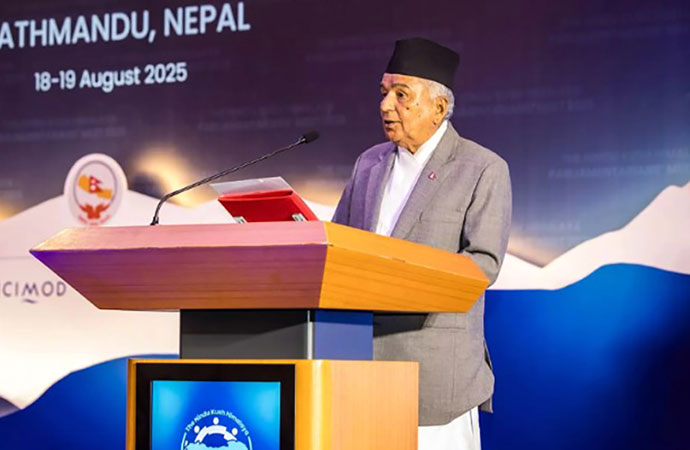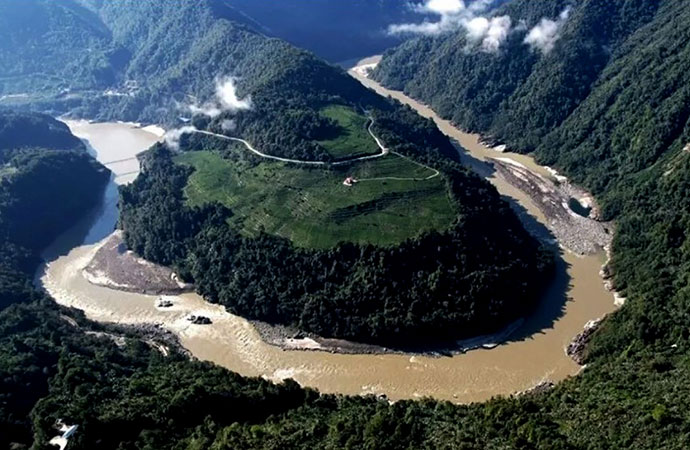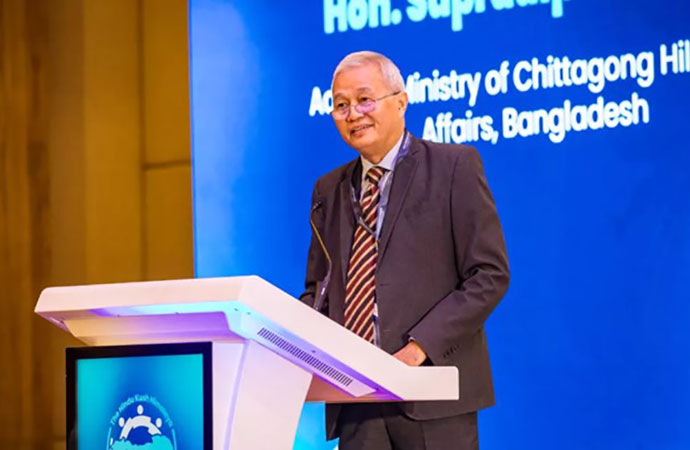Reportage

President of Nepal Ramchandra Poudel. Photo: Collected
President of Nepal Ramchandra Poudel on Monday said they, at the policy-making level, must formulate timely, people-centered and implementable policies on climate change, biodiversity, and air pollution, based on scientific facts and public voices.
"Likewise, for the strengthening of the legal framework, it is necessary to establish standards for climate-friendly development, set regulations for air pollution control, and provide essential legal provisions for the conservation of biodiversity," he said, while speaking as the chief guest at the Hindu Kush Himalaya Parliamentarians' Meet 2025.
To ensure accountability, the Nepalese President said, Parliaments must carry out their fundamental responsibility of monitoring whether programs are implemented, ensuring transparency of resources, and evaluating results.
Dev Raj Ghimire, Speaker, House of Representatives, Nepal, Dr Arzu Rana Deuba, Minister of Foreign Affairs, Nepal, Ain Bahadur Shahi Thakuri, Minister of Forests and Environment, Nepal, Supradip Chakma, Adviser to the Government of Bangladesh on Chittagong Hill Tracts Affairs, Kusum Devi Thapa, Chairperson, Agriculture, Cooperatives and Natural Resources Committee, Federal Parliament of Nepal also spoke at the inaugural session.
Parliamentarians from across the HKH countries came together to strengthen collaboration for a sustainable and resilient mountain future.
"With the parliamentarians' support, cooperation with each other and foresight to the future, the common crisis of climate change, biodiversity loss, and air pollution will be possible to address. This meet is the beginning of a roadmap for the present and a commitment for the future," said President Poudel.
He said climate change, biodiversity loss, and air pollution are no longer confined to scientific reports; they have become the harsh reality of our daily lives.
Therefore, the President said, this meeting is a historic opportunity to chart a roadmap for our common and sustainable future.
"It is an opportunity to demonstrate a strong commitment regarding the future of the Hindu Kush Himalaya region-its geography, mountains, forests, rivers, and atmosphere," he said.
The President said he has consistently drawn the attention of the global community at international forums to the adverse impacts of climate change.
"It is imperative today that all parties fulfill their respective commitments made in the Paris Agreement, particularly in limiting global temperature rise to 1.5 degrees Celsius," he said.
The waters flowing from the mountains of the region, the oxygen derived from its forests and the fertility of its agricultural lands directly or indirectly sustain the lives of more than two billion people.
"Yet, this very foundation of livelihood is now under threat," said the President.
With global warming approaching 1.5 degrees Celsius, the Hindu Kush Himalayan region is warming at a rate higher than the global average.
Scientific evidence suggests that, in line with the commitments expressed under the Paris Agreement, it is possible in the long term to limit the increase to 1.5 degrees Celsius.
However, in recent decades, the accelerated melting of glaciers in this region has become evident.
"This has triggered climate-induced disasters such as floods and landslides, affecting settlements from the downstream river valleys to communities located thousands of kilometers away," said the Nepal's President.
He said the region is rich in biodiversity and it is home to some of the world's rarest flora and fauna.
"The degradation of biodiversity is impacting food security, cultural heritage, and increasing the risk of species extinction, with grave repercussions for the overall economy," he mentioned.
Despite these challenges, the President acknowledged the remarkable initiatives taken by member states in addressing climate change, controlling air pollution, and conserving biodiversity.
"Our region has demonstrated to the world that, despite adversities, exemplary actions are possible," he said.
Notable initiatives include cooperation in production and use of hydropower, promotion of solar energy, community participation in forest conservation, development of early warning systems for climate-induced disasters-each representing important steps in regional cooperation for climate adaptation and mitigation.
For biodiversity conservation, he said the expansion of national parks and protected areas, modernisation of wildlife monitoring systems, and engagement with local communities are commendable.
"Likewise, measures taken to improve air quality through reforms in public transport, promotion of electric vehicles, and regulation of industrial emissions are also satisfactory," said the President.

























Leave a Comment
Recent Posts
Religion and Politics: A Toxic ...
At Dhaka University, cafeteria workers have been told not to wear shor ...
Enayetullah Khan joins AsiaNet ...
AsiaNet’s annual board meeting and forum was held in Singapore, ...
In a New York minute
Many leaders back a UN call to address challenges to ..
Defaulted loans at Non-Bank Financial Institutions ( ..
How the late Zubeen Garg embodied cultural affinitie ..